Abstract
OBJECTIVE--To test the validity of the fetal origins hypothesis and the classic twin method. DESIGN--Follow up study of pairs of same sex twins in which both twins survived to age 6. SETTING--Denmark. SUBJECTS--8495 twin individuals born 1870-1900, followed through to 31 December 1991. MAIN OUTCOME MEASURES--Mortality calculated on a cohort basis. RESULTS--Mortality among twins and the general population was not significantly different except among females aged 60-89, in whom mortality among twins was 1.14 times (SE 0.03) higher than in the general population. Mortality among female dizygotic twins was 1.77 times (0.18) higher than among monozygotic twins at age 30-59. Otherwise, mortality for monozygotic and dizygotic twins did not consistently differ after age 6. CONCLUSION--According to the fetal origins hypothesis the risk of adult morbidity and mortality is heightened by retardation in intrauterine growth. Twins, and in particular monozygotic twins, experience growth retardation in utero. The findings in the present study suggest that the fetal origins hypothesis is not true for the retardation in intrauterine growth experienced by twins. Furthermore, the data are inconsistent with the underlying assumption of a recent claim that the classic twin method is invalid for studies of adult diseases. The present study is, however, based on the one third of all pairs of twins in which both twins survived to age 6. The possible impact of this selection can be evaluated in future studies of cohorts of younger twins with lower perinatal and infant mortality.
Full text
PDF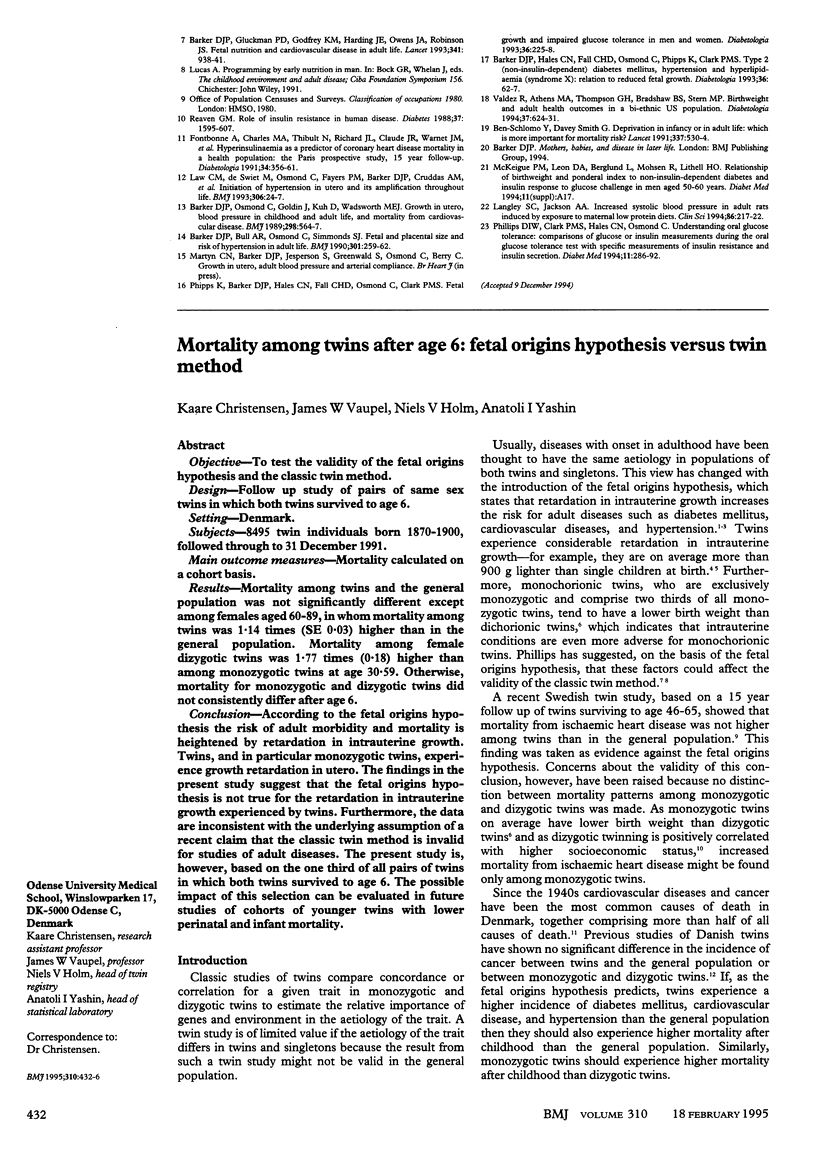
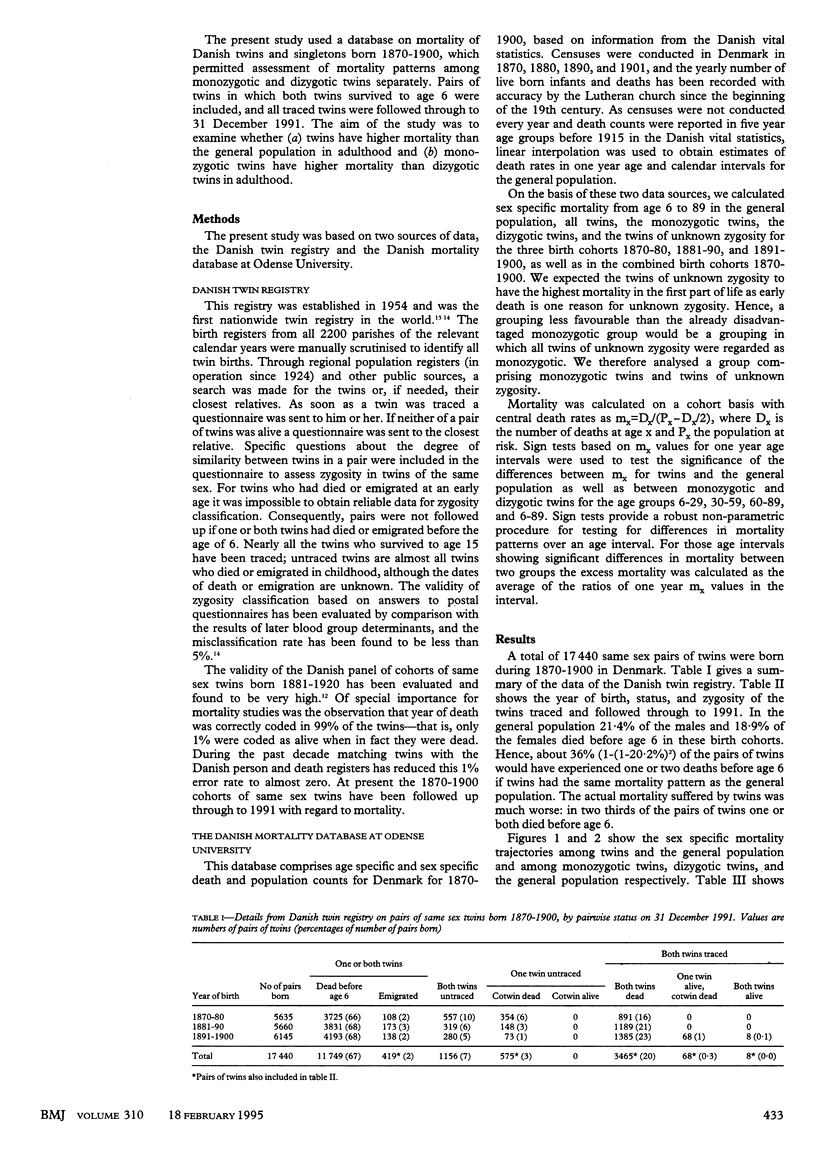
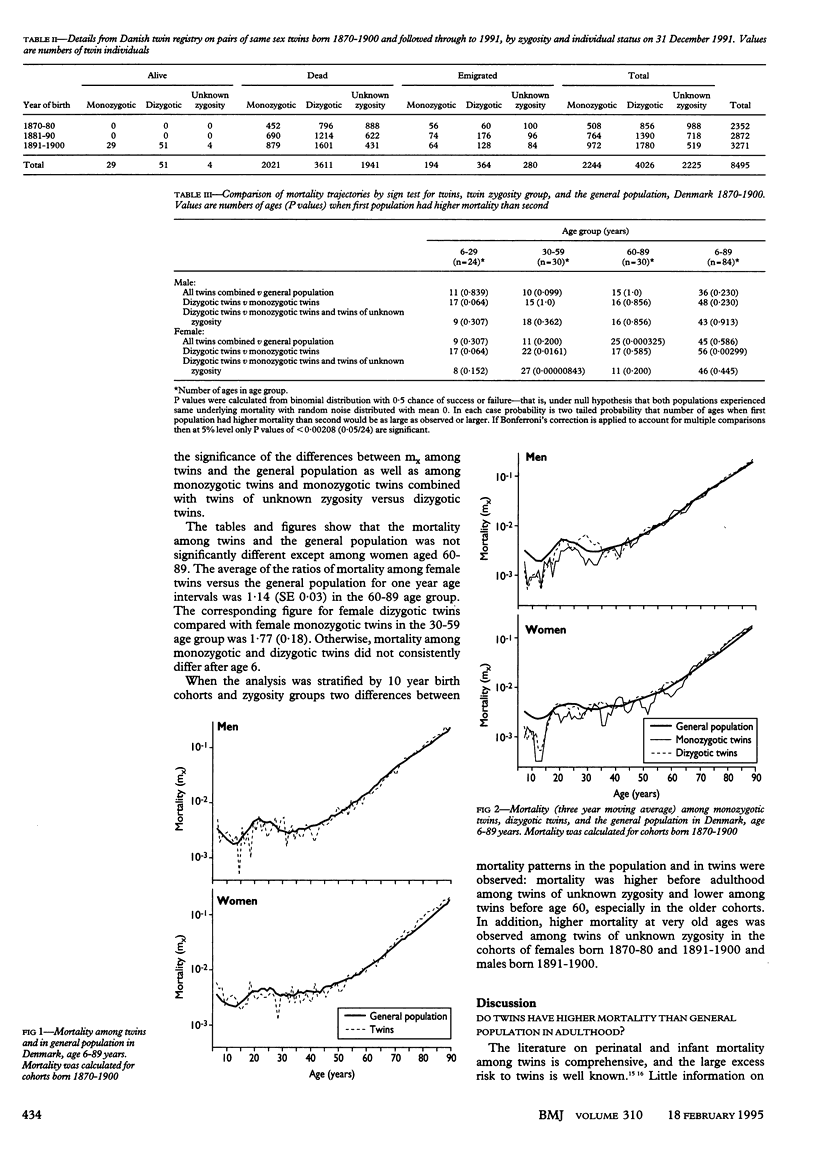
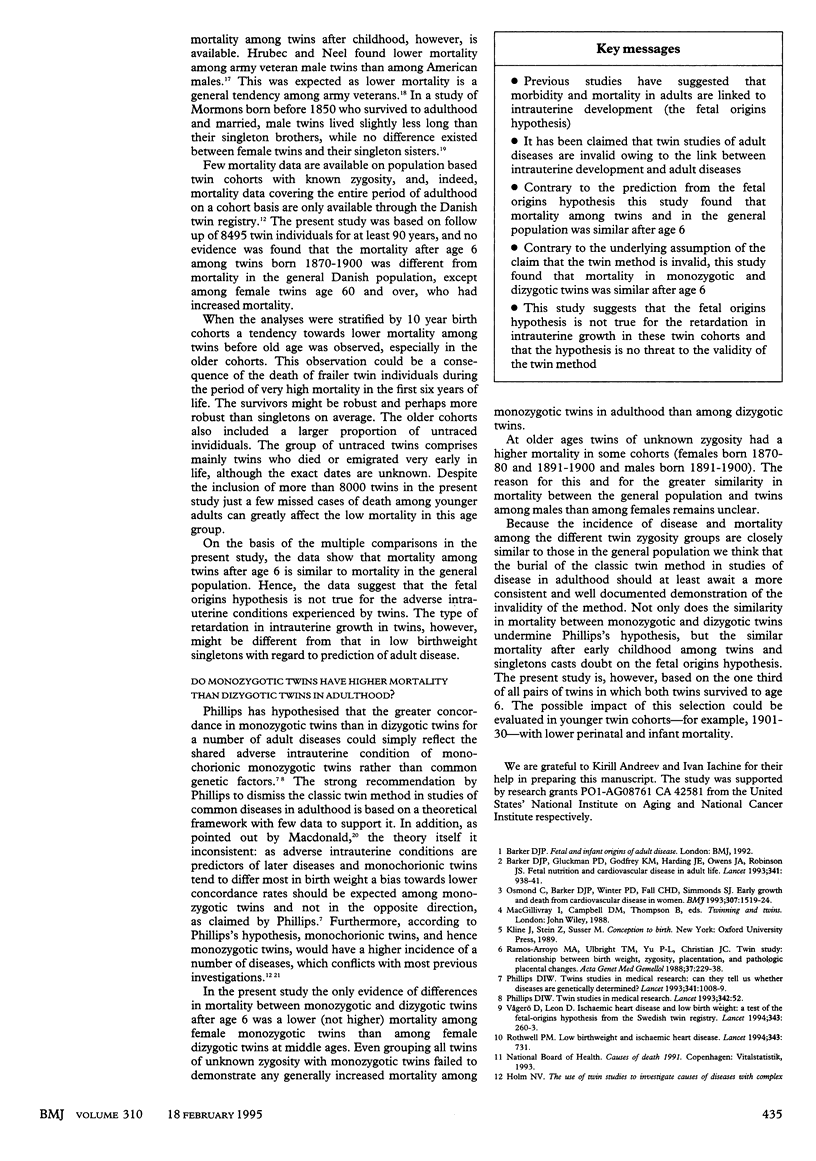
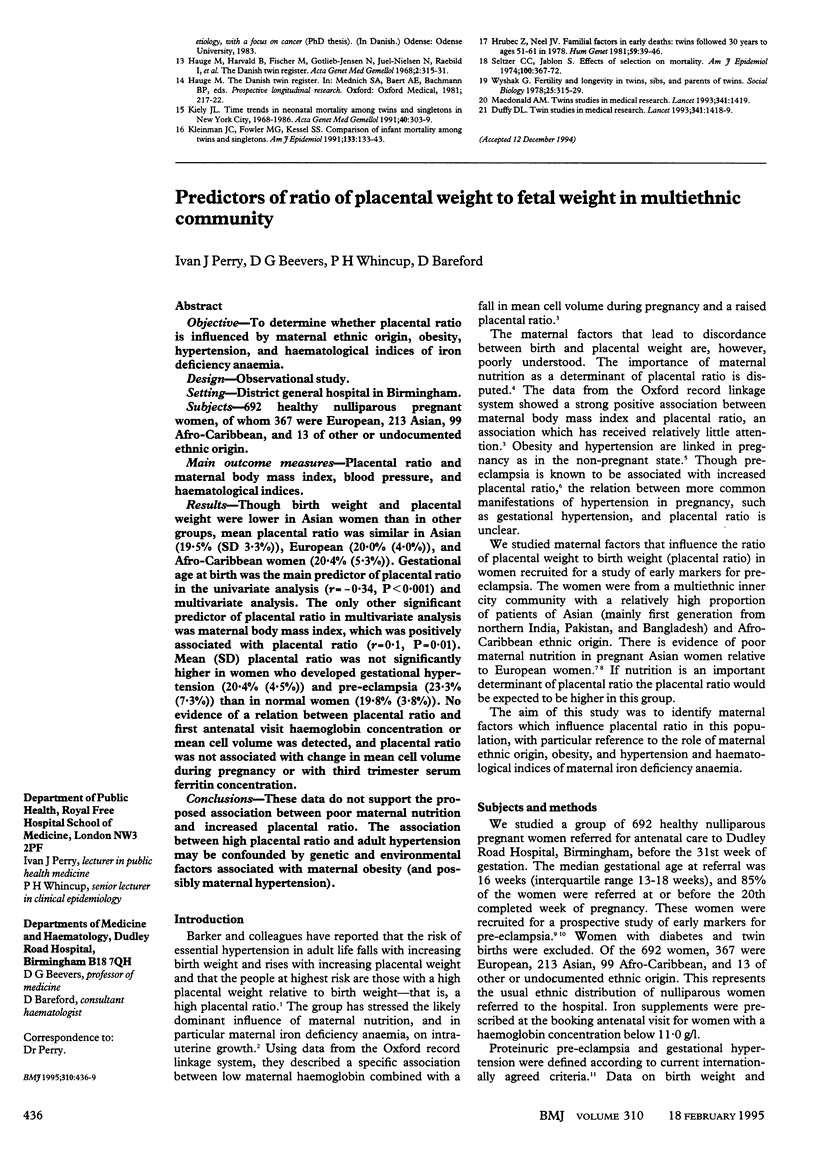
Selected References
These references are in PubMed. This may not be the complete list of references from this article.
- Barker D. J., Gluckman P. D., Godfrey K. M., Harding J. E., Owens J. A., Robinson J. S. Fetal nutrition and cardiovascular disease in adult life. Lancet. 1993 Apr 10;341(8850):938–941. doi: 10.1016/0140-6736(93)91224-a. [DOI] [PubMed] [Google Scholar]
- Duffy D. L. Twin studies in medical research. Lancet. 1993 May 29;341(8857):1418–1419. [PubMed] [Google Scholar]
- Hauge M., Harvald B., Fischer M., Gotlieb-Jensen K., Juel-Nielsen N., Raebild I., Shapiro R., Videbech T. The Danish twin register. Acta Genet Med Gemellol (Roma) 1968 Apr;17(2):315–332. doi: 10.1017/s1120962300012749. [DOI] [PubMed] [Google Scholar]
- Hrubec Z., Neel J. V. Familial factors in early deaths: twins followed 30 years to ages 51-61 in 1978. Hum Genet. 1981;59(1):39–46. doi: 10.1007/BF00278852. [DOI] [PubMed] [Google Scholar]
- Kiely J. L. Time trends in neonatal mortality among twins and singletons in New York City, 1968-1986. Acta Genet Med Gemellol (Roma) 1991;40(3-4):303–309. doi: 10.1017/s0001566000003482. [DOI] [PubMed] [Google Scholar]
- Kleinman J. C., Fowler M. G., Kessel S. S. Comparison of infant mortality among twins and singletons: United States 1960 and 1983. Am J Epidemiol. 1991 Jan 15;133(2):133–143. doi: 10.1093/oxfordjournals.aje.a115852. [DOI] [PubMed] [Google Scholar]
- Macdonald A. M. Twin studies in medical research. Lancet. 1993 May 29;341(8857):1419–1419. [PubMed] [Google Scholar]
- Osmond C., Barker D. J., Winter P. D., Fall C. H., Simmonds S. J. Early growth and death from cardiovascular disease in women. BMJ. 1993 Dec 11;307(6918):1519–1524. doi: 10.1136/bmj.307.6918.1519. [DOI] [PMC free article] [PubMed] [Google Scholar]
- Phillips D. I. Twin studies in medical research. Lancet. 1993 Jul 3;342(8862):52–52. doi: 10.1016/0140-6736(93)91916-a. [DOI] [PubMed] [Google Scholar]
- Phillips D. I. Twin studies in medical research: can they tell us whether diseases are genetically determined? Lancet. 1993 Apr 17;341(8851):1008–1009. doi: 10.1016/0140-6736(93)91086-2. [DOI] [PubMed] [Google Scholar]
- Ramos-Arroyo M. A., Ulbright T. M., Yu P. L., Christian J. C. Twin study: relationship between birth weight, zygosity, placentation, and pathologic placental changes. Acta Genet Med Gemellol (Roma) 1988;37(3-4):229–238. doi: 10.1017/s0001566000003834. [DOI] [PubMed] [Google Scholar]
- Rothwell P. M. Low birthweight and ischaemic heart disease. Lancet. 1994 Mar 19;343(8899):731–731. [PubMed] [Google Scholar]
- Seltzer C. C., Jablon S. Effects of selection on mortality. Am J Epidemiol. 1974 Nov;100(5):367–372. doi: 10.1093/oxfordjournals.aje.a112047. [DOI] [PubMed] [Google Scholar]
- Vågerö D., Leon D. Ischaemic heart disease and low birth weight: a test of the fetal-origins hypothesis from the Swedish Twin Registry. Lancet. 1994 Jan 29;343(8892):260–263. doi: 10.1016/s0140-6736(94)91112-6. [DOI] [PubMed] [Google Scholar]
- Wyshak G. Fertility and longevity in twins, sibs, and parents of twins. Soc Biol. 1978 Winter;25(4):315–330. doi: 10.1080/19485565.1978.9988353. [DOI] [PubMed] [Google Scholar]


